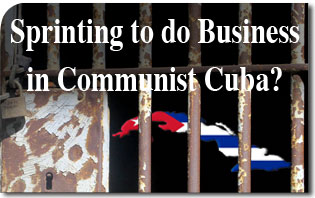by Gary J. Isbell
American telecom giant Sprint Corporation has the not-so-coveted distinction of having signed the first trade agreement with communist Cuba to provide cellular roaming coverage to the few Cubans that have phones and some tourists. Sprint hopes to turn a profit on the combination of visiting Americans and the little more than 15 percent of the Cubans that actually own a cell phone.
As the Cuban economy slowly dies from the inexorable grip of communism, the Castro brother dictators have conjured up another idea of attracting foreign business to prop up their moribund economy. The new idea was the recent state sponsored fair called the Havana International Fair (FIHAV). The promotion sought to promote what it called “Cuba’s changing business climate” that is struggling to secure sorely needed foreign investment.
One major problem corporations face is that all business deals must go through the communist government or one of its tightly controlled state companies. High taxes, suffocating regulations, past property confiscations are making most foreign companies more than gun-shy to do business with a socialist state.To counter these handicaps, present dictator Raul Castro boasts of a new investment law aimed at cutting foreign taxes and improved ties with the United States. While he crows of his new found relationship with the U.S. as an advantage in attracting foreign investors, ironically he says “we must not expect that in order forrelations with the United States to improve, Cuba will abandon the ideas that it has struggled for.”[1]
In other words, business as usual for the apparatchik. Cuba will continue to suffer under socialist totalitarianism brutally oppressing anyone who disagrees.The Castros are fully committed to keeping Cuba a socialist state and are not broadening business opportunities to foreign investors as a step to a free market economy.
By attracting foreign investment, they are hoping to build a sustainable socialist state. This statement would be laughable if it were not entirely cynical. A socialist state is unsustainable by its very nature. Socialism is no different than any other Ponzi scam. At first it appears like utopia, then after a short while, the originators need to find an endless supply of investors to keep it afloat.
As the late Margret Thatcher so succinctly put it, “The trouble with socialism is that eventually you run out of other people’s money.” If it were not for decades of handouts from the Soviet Union and then Venezuela, Cuba would most likely not exist today. So why is Sprint so anxious to sign a deal with country that has so little to offer?
As with any nation strangled by communism, a broad consumer base does not exist in Cuba because the state sets most wages and prices thus preventing just wages and private initiative. Take for example the disparity and lack of buying powerbetween an average doctor’s monthly wage and a taxi driver. A Cuban doctor can now earn up to a stunning $67 per month[2] while a taxi driver can earn as much as $1,500 per month.[3]
This inequality stems from the socialist state mandating what it calls “free healthcare” for all citizens, and consequently dictates a doctor’s wage and prices for his services in order to offer healthcare for free.
Unfortunately, government mandates removes all incentives for a doctor to care for his patients well and perfect his practice while obliging him to accept bribes to make ends meet—which is how business is done in Cuba. On the contrary, despite the fact that a taxi drive has to pay $20 per day in taxes to the politburo, he is free to keep the rest. With a few rides to the airport at $25 he is poised to be one of the highest paid professions on the prison island.
Clearly the Castros have no intention of abandoning the erroneous ideas of communism. It seems like the only ones making concessions today are those willing to compromise their principles and bow to socialist despots. With so little to gain and so much to lose, perhaps that is why only 30 U.S. companies showed up at the FIHAV event—not exactly sprinting to do business with communist Cuba.
1.
https://www.washingtonpost.com/world/the_americas/obamas-new-cuba-policy-could-transform-washingtons-ties-with-latin-america/2014/12/20/8e6ee050-2180-409a-a15b bc8806cc045d_story.html ↑
2.
http://www.medicaldaily.com/cuban-doctors-get-salary-raises-67-month-after-government-cuts-100k-redundant-jobs-272310 ↑
3.
http://www.vox.com/2015/10/26/9593658/cuban-castro-taxi-driver-doctor-economy ↑


No comments:
Post a Comment